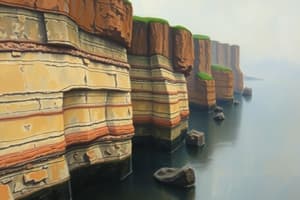Podcast
Questions and Answers
What is the primary function of a magma chamber?
What is the primary function of a magma chamber?
- To solidify igneous rock
- To store magma before it erupts (correct)
- To release gases into the atmosphere
- To interact with tectonic plates
Which geological process leads to the formation of trenches?
Which geological process leads to the formation of trenches?
- Volcanic eruptions
- Weathering of igneous rocks
- Subduction of tectonic plates (correct)
- Erosion of coastlines
What is a significant impact of volcanic eruptions on the environment?
What is a significant impact of volcanic eruptions on the environment?
- Stabilization of weather patterns
- Immediate and long-term climate changes (correct)
- Decrease in mineral resources
- Reduction in soil fertility
Which type of plate boundary is primarily associated with creating mountain ranges?
Which type of plate boundary is primarily associated with creating mountain ranges?
What role does deposition play in geological processes?
What role does deposition play in geological processes?
What is the primary difference between physical and chemical weathering?
What is the primary difference between physical and chemical weathering?
Which process describes the movement of sediments from one location to another?
Which process describes the movement of sediments from one location to another?
What geological feature is formed as a result of seafloor spreading?
What geological feature is formed as a result of seafloor spreading?
Which layer of the Earth is primarily composed of molten rock?
Which layer of the Earth is primarily composed of molten rock?
In which type of fault does the block above the fault move downward relative to the block below?
In which type of fault does the block above the fault move downward relative to the block below?
What characteristic defines a syncline in geological terms?
What characteristic defines a syncline in geological terms?
What mechanism primarily drives the process of coastal erosion?
What mechanism primarily drives the process of coastal erosion?
What is the primary reason for geomagnetic reversals occurring on Earth?
What is the primary reason for geomagnetic reversals occurring on Earth?
Flashcards
What is a magma chamber?
What is a magma chamber?
The area beneath the Earth's surface where molten rock, known as magma, collects before an eruption.
What is solidification in volcanism?
What is solidification in volcanism?
The process where magma cools and solidifies, transforming into igneous rock.
What are transform boundaries?
What are transform boundaries?
Tectonic plates sliding past each other horizontally, creating friction and causing earthquakes.
What is subduction?
What is subduction?
Signup and view all the flashcards
What is seafloor spreading?
What is seafloor spreading?
Signup and view all the flashcards
Weathering
Weathering
Signup and view all the flashcards
Physical Weathering
Physical Weathering
Signup and view all the flashcards
Chemical Weathering
Chemical Weathering
Signup and view all the flashcards
Erosion
Erosion
Signup and view all the flashcards
Inner Core
Inner Core
Signup and view all the flashcards
Lithosphere
Lithosphere
Signup and view all the flashcards
Continental Drift
Continental Drift
Signup and view all the flashcards
Seafloor Spreading
Seafloor Spreading
Signup and view all the flashcards
Study Notes
Weathering and Erosion
- Weathering: The process of breaking down and corroding solid rocks into sediments.
- Types of Weathering:
- Physical (Mechanical): Breakdown of rocks without chemical change (e.g., freeze-thaw, thermal expansion)
- Chemical: Breakdown of rocks through chemical reactions (e.g., oxidation, hydrolysis, carbonation)
- Examples of chemical weathering:
- Dissolution: Minerals dissolving in water
- Oxidation: Minerals reacting with oxygen, forming oxides (e.g., rust)
- Hydration: Minerals absorbing water, causing expansion and weakening.
- Erosion: The process of moving sediments from one location to another.
- Main forces of erosion:
- Water (rivers, rainfall, runoff)
- Wind (sand dunes)
- Ice (glaciers, ice sheets)
- Coastal forces (waves, tides)
Earth's Layers and Plate Tectonics
- Earth's Layers:
- Inner Core: Solid sphere, mainly iron and nickel
- Continental Crust: Approximately 35-70 km thick
- Lithosphere: About 100 km thick, composed of the crust and upper mantle
- Asthenosphere: Plastic, partially molten layer beneath the lithosphere
- Plate Tectonics:
- Alfred Wegener's Continental Drift Theory (1912): Continents were once a single landmass (Pangaea) and have drifted apart
- Seafloor Spreading: Creation of new oceanic crust at mid-ocean ridges, pushing tectonic plates apart.
- Henry Hess: Proposed the theory of seafloor spreading
- Mid-Ocean Ridges: Formed as a result of seafloor spreading
- Geomagnetic Reversals: Occur every 200,000-300,000 years
Folding and Faulting
- Folding:
- Anticline: Convex upward fold, oldest rocks at the core
- Syncline: Concave upward fold, youngest rocks at the core
- Monocline: Step-like fold in rock strata
- Plunging Fold: Fold with a non-horizontal axis
- Faulting:
- Normal Fault: Block above the fault moves downward relative to the block below
- Reverse Fault: Block above the fault moves upward relative to the block below
- Strike-Slip Fault: Horizontal sliding of rock blocks
Volcanism and Magmatism
- Magma and Magma Chambers:
- Components: Gases, minerals, and liquid rock
- Magma Chamber: Stores magma before eruption
- Solidification: Magma cools and crystallizes into igneous rock
- Volcanic Activity:
- Importance of study: Provides insights into volcanic activity and crust formation
- Effects on environment: Volcanic eruptions significantly alter landscapes and impact climate
Geological Processes and Landforms
- Erosion and Deposition:
- Deposition: Builds up layers of sediment, creating new landforms
- Landform Formation: Trenches form due to tectonic plate interactions (e.g., subduction)
- Plate Boundaries:
- Transform Boundaries: Earthquakes occur due to stress buildup as plates grind together
- Continental-Continental Boundaries: Create large mountain ranges through the crumpling and thickening of the crust
- Oceanic-Continental Boundaries: Result in subduction of the denser oceanic plate beneath the less dense continental plate
- Divergent Boundaries: Associated with seafloor spreading and creation of new oceanic crust.
Studying That Suits You
Use AI to generate personalized quizzes and flashcards to suit your learning preferences.




